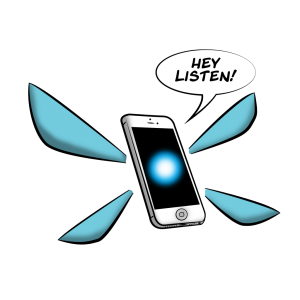Untangling the web
By Natalie Serafini, Opinions Editor
Bizarre and outlandish of an addiction as it might sound, Internet Addiction Disorder (IAD) has become a prevalent part of many peoples’ daily lives. Granted, it doesn’t connote the same absurdity as the plethora of follies seen on My Strange Addiction; yet it’s difficult to think of the Internet—in the infancy of its existence, but so much a part of society—as a threat to anyone’s functioning. Still, this is an issue that concerns university and college students, as studies show that rates of Internet addiction are higher amongst youth and young adults worldwide. Internet addicts often cannot disentangle themselves from the Web, might lie to friends and family about their attachment, and may begin to see their obsession taking a toll on their work. No doubt about it, IAD can be a serious obstacle to overcome. I think, though, that addiction to technology and the Web could be seen as a spectrum, and that most people fall somewhere—however mild or extreme—on that spectrum.
For months now, I’ve had difficulty finishing off an entire book. It isn’t for lack of trying, or for lack of time, but more an inability to focus. Although I’ve been blaming the absence of books in my life on the amount of textbook reading inherent to college life, I’m coming to the conclusion that the problem is an unhealthy attachment to the Web. I spend a substantial amount of time online, and sometimes find myself falling asleep while watching YouTube videos. I wouldn’t say I’m addicted to the Internet, but I could probably redirect a good chunk of my time towards healthier and more productive pursuits.
Obviously there’s a lot to love about the Net—otherwise it wouldn’t lure people in with such ease. We all know that it makes communication and learning simpler, with Facebook, Twitter, news sites, and databases a few tip-tap-types away. The online connections also make social movements and campaigns much easier to share. Occupy Wall Street began as a social media movement, and our Facebook timelines still show the imprints that Kony 2012 left behind. The Internet facilitates self-expression, debate, and access to images of cats. It’s better than Disneyland, as far as I’m concerned.
Still, those delightful aspects begin to be eclipsed by the health and psychological effects of technology and the Internet. A phenomenon known as phantom cell phone syndrome involves thinking you feel your phone vibrating in your pocket, and finding nothing there. Studies have begun to tentatively link social anxiety and depression to excessive computer use. Other studies have suggested that the craving for online gaming and the Internet is comparable to cravings seen in substance addictions. And there are the health issues associated with staring at a computer screen for hours at a time: headaches, eye strain, and slumped posture are just some short-term effects of excessive computer use. I imagine sitting for hours doesn’t do wonders for long-term health, either.
Again, I love the Internet, and the list of reasons why it’s great goes on much longer than the short one I made. I’m not even tremendously bothered by the physical health consequences of stooped posture and failing eyesight—that’s what chiropractors and glasses are for, right? But the links to social anxiety, depression, and an inability to focus are disturbing. Every generation has its challenges, or some quality that marks its members as distinct from others; are we the generation of Internet addicts? I refuse to believe that we are irreparably linked to our technological appendages. I’m not going to suggest that we abandon the Net entirely, but hopefully there exists a manageable balance between work, school, social life, and the requisite time spent staring at a screen.



